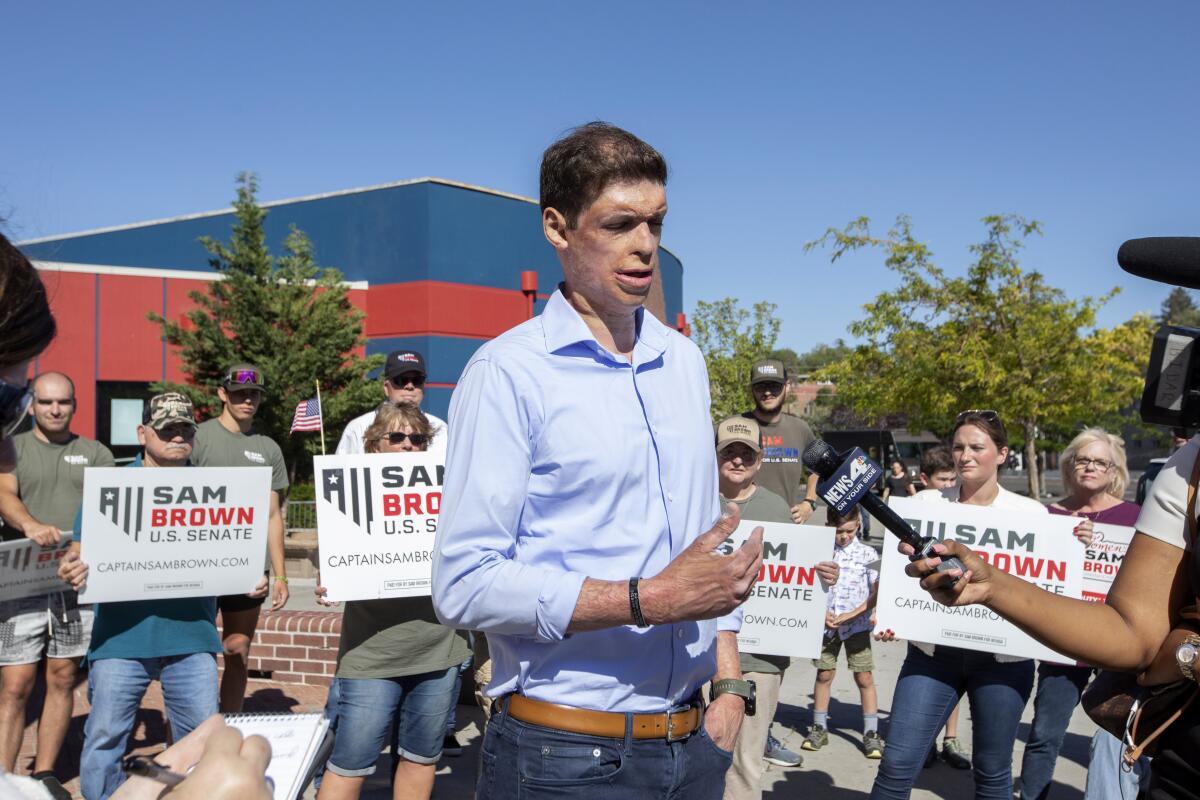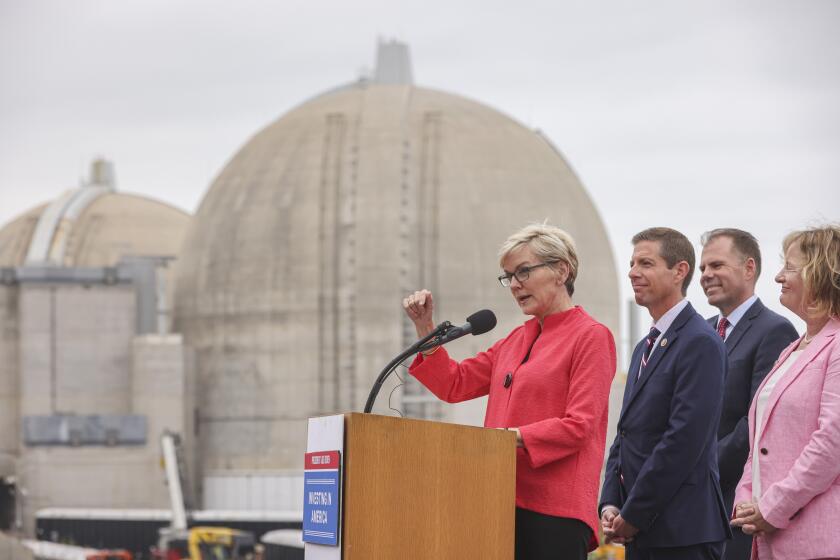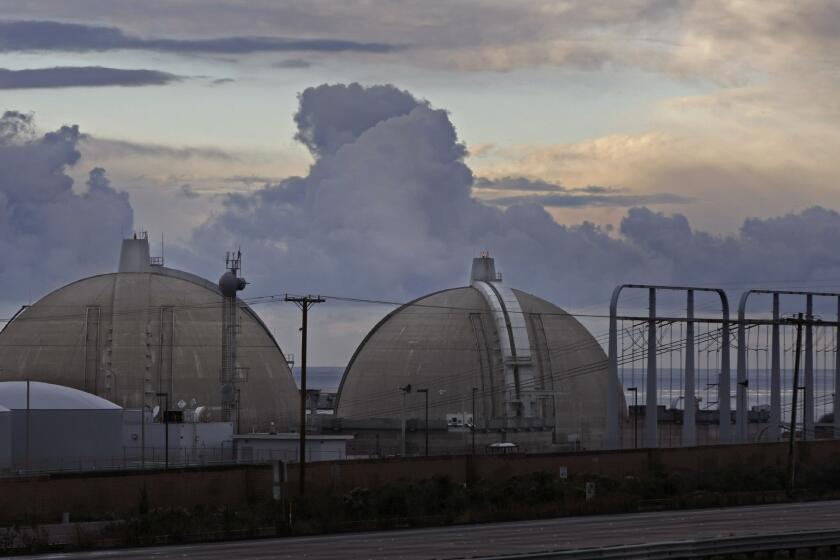Nuclear waste storage at Yucca Mountain could roil Nevada U.S. Senate race

- Share via
More than 3.5 million pounds of highly radioactive nuclear waste is buried on a coastal bluff just south of Orange County, near an idyllic beach name-checked in the Beach Boys’ iconic “Surfin’ U.S.A.”
Spent fuel rods from the closed San Onofre nuclear power plant were supposed to be sent to a long-planned federal repository in Yucca Mountain in Nevada, about 100 miles northwest of Las Vegas.
But vociferous opposition from a broad, bipartisan coalition of political, business, environmental and tribal leaders in Nevada has blocked the creation of the federal graveyard for nuclear detritus from San Onofre, as well as more than 100 other sites across the nation.
Yucca Mountain is a third rail in Nevada politics — akin to the limits on California property tax increases created by Proposition 13. That’s why presidents of both parties have backed away from creating the repository in the Silver State, whose voters are increasingly crucial to winning the White House.
All of which makes comments by Nevada GOP Senate candidate Sam Brown about Yucca Mountain so remarkable.
In recent years, Brown supported opening the facility, calling the failure to do so an “incredible loss of revenue for our state.” Asked about the comments in the context of a Senate race that could determine which party controls the Senate after the November election, Brown did not reiterate his support but said he favors increased efforts to diversify the state’s economy without sacrificing safety.
Yucca Mountain was approved by Congress more than two decades ago, but Nevada politicians of both parties have blocked funding appropriations, so only preliminary work has been completed on the repository.
Brown was asked about the future of the project two years ago.
“If we don’t act soon, other states … are assessing whether or not they can essentially steal that opportunity from us,” Brown said in response to a question at a 2022 Southern Hills Republican Women’s luncheon at Dragon Ridge Country Club in Henderson, Nev.
“We all know that Nevada could use another great source of revenue and it sure would be a shame if we didn’t monopolize on that and become a central hub of new development that we can do at Yucca,” he said in a recording of the meeting obtained by The Times.
- Share via
Brown’s campaign did not respond when asked whether his remarks represented his current views about Yucca Mountain, but provided a statement from the Army combat veteran.
“I’m always interested in economic opportunities for Nevada that better diversify our economy. As the next Senator, I will look at every avenue available to make Nevada the most prosperous it possibly can be while continuing to protect the safety of our water supply, expand tourism revenue, and grow opportunities for all businesses,” Brown said. “With energy prices doubling last year, we need leadership to explore all energy solutions for a better Nevada.”

Brown is the front-runner in the GOP Senate primary, which will be held on June 11 and determine which Republican takes on Democratic incumbent Sen. Jacky Rosen in the fall.
A spokesperson for Rosen said the Republican’s position endangers Nevadans and makes him unfit to represent the state.
“Nevada Republicans and Democrats have been fighting against storing dangerous nuclear waste at Yucca Mountain for decades, but Sam Brown agrees with the D.C. politicians in Congress who still want to turn Nevada into the nation’s dumping ground for toxic waste,” said spokesperson Johanna Warshaw.
Energy Secretary Jennifer Granholm unveils program to jump-start a process to attract communities to take waste from power plants until a permanent site is built
Though the creation of long-term radioactive waste storage on federal land at Yucca Mountain, near a historical nuclear testing range, was approved by Congress in 2002, efforts to build it have been blocked by Presidents Obama, Trump and Biden, in part a recognition of Nevadans’ importance in the nation’s politics as well as the power of Sin City’s casinos.
Three out of four likely voters in the state opposed the project in a 2017 poll conducted for the Reno Gazette-Journal.
Though the state has become increasingly Democratic in recent years and voted against Trump in the last two presidential elections, Nevada is expected to be hotly contested in November. Trump leads Biden by 3.2 points in an average of recent polling there, according to Real Clear Politics.
White House says no funding for the nuclear waste site will be included in proposed budget.
Nevada is also among the states that will determine which party controls the Senate, where Democrats currently have a 51-49 majority. Though Rosen polls better than Biden, the contest is viewed as one of the most competitive Senate races in the nation.
Brown, in his 2022 remarks, said that “a lack of understanding” and “fearmongering” by the late former Sen. Harry Reid, a Democratic powerhouse, and others would ultimately harm the state’s economy.
But many Nevada Republicans also have opposed the project, including former Govs. Brian Sandoval and Jim Gibbons, U.S. Rep. Mark Amodei, former Atty. Gen. Adam Laxalt and former Secretary of State Barbara Cegavske, as well as business groups such as the Las Vegas Chamber of Commerce and the Las Vegas Convention And Visitors Authority. Some rural Nevadans have supported the creation of the repository for economic reasons.
A bipartisan vote to move forward with Yucca Mountain, long blocked by Reid, occurred in 2018 as Rosen, then a member of the House, ran against GOP Sen. Dean Heller. Though the proposal passed the House, Heller effectively blocked funding for the creation of the repository in the Senate before Rosen beat him in the general election.
Trump and Biden have both said they would not fund the project, but Nevadans were alarmed this month by pro-Yucca comments made by lawmakers during a hearing by the House Energy and Commerce Committee that were viewed as a signal there will be renewed efforts to store nuclear waste in their state.
Get the L.A. Times Politics newsletter
Deeply reported insights into legislation, politics and policy from Sacramento, Washington and beyond. In your inbox twice per week.
You may occasionally receive promotional content from the Los Angeles Times.
“Opposition is not safety-related or technical,” said Rep. Cathy McMorris Rodgers (R-Wash.), the committee chair. “It’s political.Opposition from states like Nevada in particular to this program has inhibited congressional appropriations and driven the executive branch to dismantle what had been an otherwise technically successful program.”
Michael Green, a history professor at the University of Nevada, Las Vegas, predicted that Brown’s comments will come back to haunt him.
“I can imagine the ads about the dangers and nuclear power accidents and the like,” Green said. “I don’t think he has done himself any favors.”
More to Read
Get the L.A. Times Politics newsletter
Deeply reported insights into legislation, politics and policy from Sacramento, Washington and beyond. In your inbox twice per week.
You may occasionally receive promotional content from the Los Angeles Times.













